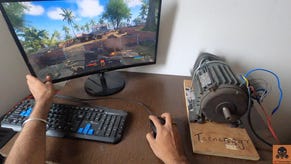Scaremongering Anew
Some interesting (and perhaps worrying) facts'n'quotes over in this report on PC industry heavyweights discussing the future of the ol' IBM Compatible as a gaming platform. They claim all is rosy and well, but it seems PC gaming generates half a billion dollars less now than it did in 2001 - though as the piece points out this doesn't include digital distribution such as Gametap or Steam (and, I'd guess, MMO subscriptions too). Or, indeed, pirated copies of games, the elephant in that particular room which doesn't seem to have been mentioned, and could quite possibly account for some of the drop from $1.5 billion to $970 million over the last five years.
I can't help but get a little bit snooty and defensive when I hear talk of something rotten in the state of PC gaming.
"But it seems that PC gaming is becoming more of a specialized experience for only certain types of games. At an event last week, Intel's Dadi Perlmutter, vice president and general manager of Intel's mobility division, bemoaned the fact that just about every game developed for the PC these days seems to involve killing on a mass scale. There's more to it than that, of course, but PC games do seem to either be first-person shooters or complex role-playing and strategy games. And that's the interesting question for the PC industry: people are buying PCs anyway, why don't game developers focus on casual yet compelling games for those of us without an itchy trigger finger? "
While it's true that there aren't any truly high profile casual games to speak of (and even when there are, they seem to be overlooked. Read many excited features about Guitar Hero III on PC lately? I've got hold of a copy, and will be writing about it soon, hopefully), it's a big money-spinner for the few that take it very seriously, while lesser-known publishers and no-budget indie games scratch every possibly gaming itch a PC owner could have. Taking off the Wii-tinted spectacles for a moment, ultra-violence is far more of a mainstay on the consoles than on PC, simply because of the sheer variety you get on this platform that you don't on others.
Granted, we do talk about games with guns in quite a lot on RPS, but look at all the whimsy and obscura we mention too. I spent this morning with moral-juggling Flash adventure Move Or Die. I popped in on Kieron yesterday and found him staring in cheery confusion at some batshit horse management game. John's probably getting all teary over some point'n'click heroine even as you read this. And Jim.. well, Jim really likes shooting men. We never live the same day twice, at any rate.
Of course, the gathering of moneymen mentioned in the CNET piece wasn't to celebrate Launchball or Splume, which frankly aren't pouring millions into the industry's coffers (and nor should they). It was about how to make more money from PC gaming, and right now, that does indeed involve mass-murder depicted with cutting edge graphical technology. As the piece points out, even the highest-end PC available now can't run Crysis at is absolute visual best. While that bodes well for revisiting the game in a year or two, it's incredibly disheartening for people without ultra-biff machines. Yes, it'll play OK at minimal detail, but with that comes a feeling of missing out. I know I've been doggedly playing Crysis with the detail levels as high as I can ramp them up without passing out from low-framerate motion sickness.
So hearing Intel's Randy Stude say ""Something needs to be done so a person buying a PC at Wal-Mart could be a PC gamer too" could be good news. Intel's integrated 'Extreme' graphics chip is infamously poxy (and the ludicrously hyperbolic name doesn't help) - there needs to be an affordable GPU built into motherboards that is realistically capable of a good couple of years' of contemporary gaming, and not a few months of just about coping at minimal detail settings. People shouldn't have to spend more on a gaming PC than they would on a console, and they shouldn't have to take the side off the case and work out how to fit a new graphics card if they don't want to. There have been numerous attempts, but they've always seemed afraid of standing on the toes of the ludicrously profitable 3D card market. Equally, there do need to be more high-profile (and high quality) games that don't require a powerhouse card and years of WASD muscle memory. I hope that can happen, as I do tire of both seeing a targeting reticule in the middle of my monitor and of suffering the twice-annual dread that my PC's no longer good enough.
But frankly, I roll my eyes whenever I hear even a hint of PC doomsaying. As has always been the case, it's easy to worry about the PC's long-term future as a gaming platform in the face of fixed, affordable console hardware, but right now it benefits from ports of most of the consoles' big titles, its own exclusives such as Crysis, an unparalleled collection of indie games and mods, and it's at the very forefront of digital distribution. Clearly, the money won't all go down the traditional avenues - and I know I'm fine with that.










